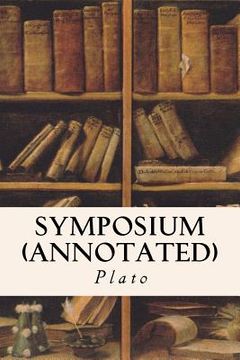Reseña del libro "Symposium (annotated) (en Inglés)"
The Symposium is a philosophical text by Plato dated c. 385-370 BC. It depicts a friendly contest of extemporaneous speeches given by a group of notable men attending a banquet. The men include the philosopher Socrates, the general and political figure Alcibiades, and the comic playwright Aristophanes. The speeches are to be given in praise of Eros, who is the god of love and desire, and the son of Aphrodite. In the Symposium, Eros is recognized both as erotic love, and as a phenomenon that is capable of inspiring courage, valor, great deeds and works, and vanquishing man's natural fear of death. It is seen as transcending its earthly origins, and attaining spiritual heights. This extraordinary elevation of the concept of love raises a question of whether some of the most extreme extents of meaning might be intended as humor or farce. Eros is almost always translated as "love", and the English word has its own varieties and ambiguities that provide additional challenges to the effort to understand the Eros of ancient Athens. The event depicted in the Symposium is a banquet attended by a group of men, who have come to the symposium, which was, in ancient Greece, a traditional part of the same banquet that took place after the meal, when drinking for pleasure was accompanied by music, dancing, recitals, or conversation.[6] The setting means that the participants will be drinking wine; this suggests that the men might be induced to say things they wouldn't say elsewhere or when sober. They might speak frankly, or take risks, or be prone to hubris - they might even be inspired to make speeches that are particularly heartfelt and noble. The host has challenged the men to deliver, each in turn, an encomium - a speech in praise of Love (Eros). The party takes place at the house of the tragedian Agathon in Athens. This dialogue is one of Plato's major works; it is appreciated for its philosophical content and literary quality. The Symposium is considered a dialogue - a form used by Plato in more than thirty works - but in fact it is predominantly a series of essay-like speeches from differing points of view. So dialogue plays a smaller role in the Symposium than it does in Plato's other dialogues. With dialogue, Socrates is renowned for his dialectic, which is his ability to ask questions that encourage others to think deeply about what they care about, and articulate their ideas. In the Symposium the dialectic exists among the speeches: in seeing how the ideas conflict from speech-to-speech, and in the effort to resolve the contradictions and see the philosophy that underlies them all. It is important to understand that the Symposium is, like all of Plato's dialogues, fiction. The characters and the settings are to some degree based on history, but they are not reports of events that actually occurred or words that were actually spoken. There is no reason to think they were not composed entirely by Plato. The reader, understanding that Plato was not governed by the historical record, can read the Symposium, and ask why the author, Plato, arranged the story the way he did, and what he meant by including the various aspects of setting, composition, characters, and theme, etc.

